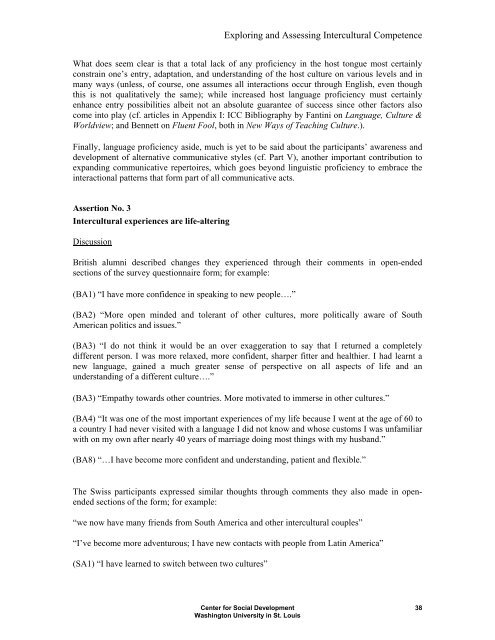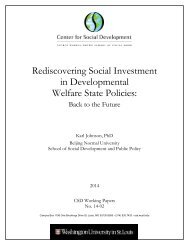Exploring and Assessing Intercultural Competence - Center for ...
Exploring and Assessing Intercultural Competence - Center for ...
Exploring and Assessing Intercultural Competence - Center for ...
You also want an ePaper? Increase the reach of your titles
YUMPU automatically turns print PDFs into web optimized ePapers that Google loves.
<strong>Exploring</strong> <strong>and</strong> <strong>Assessing</strong> <strong>Intercultural</strong> <strong>Competence</strong><br />
What does seem clear is that a total lack of any proficiency in the host tongue most certainly<br />
constrain one’s entry, adaptation, <strong>and</strong> underst<strong>and</strong>ing of the host culture on various levels <strong>and</strong> in<br />
many ways (unless, of course, one assumes all interactions occur through English, even though<br />
this is not qualitatively the same); while increased host language proficiency must certainly<br />
enhance entry possibilities albeit not an absolute guarantee of success since other factors also<br />
come into play (cf. articles in Appendix I: ICC Bibliography by Fantini on Language, Culture &<br />
Worldview; <strong>and</strong> Bennett on Fluent Fool, both in New Ways of Teaching Culture.).<br />
Finally, language proficiency aside, much is yet to be said about the participants’ awareness <strong>and</strong><br />
development of alternative communicative styles (cf. Part V), another important contribution to<br />
exp<strong>and</strong>ing communicative repertoires, which goes beyond linguistic proficiency to embrace the<br />
interactional patterns that <strong>for</strong>m part of all communicative acts.<br />
Assertion No. 3<br />
<strong>Intercultural</strong> experiences are life-altering<br />
Discussion<br />
British alumni described changes they experienced through their comments in open-ended<br />
sections of the survey questionnaire <strong>for</strong>m; <strong>for</strong> example:<br />
(BA1) “I have more confidence in speaking to new people….”<br />
(BA2) “More open minded <strong>and</strong> tolerant of other cultures, more politically aware of South<br />
American politics <strong>and</strong> issues.”<br />
(BA3) “I do not think it would be an over exaggeration to say that I returned a completely<br />
different person. I was more relaxed, more confident, sharper fitter <strong>and</strong> healthier. I had learnt a<br />
new language, gained a much greater sense of perspective on all aspects of life <strong>and</strong> an<br />
underst<strong>and</strong>ing of a different culture….”<br />
(BA3) “Empathy towards other countries. More motivated to immerse in other cultures.”<br />
(BA4) “It was one of the most important experiences of my life because I went at the age of 60 to<br />
a country I had never visited with a language I did not know <strong>and</strong> whose customs I was unfamiliar<br />
with on my own after nearly 40 years of marriage doing most things with my husb<strong>and</strong>.”<br />
(BA8) “…I have become more confident <strong>and</strong> underst<strong>and</strong>ing, patient <strong>and</strong> flexible.”<br />
The Swiss participants expressed similar thoughts through comments they also made in openended<br />
sections of the <strong>for</strong>m; <strong>for</strong> example:<br />
“we now have many friends from South America <strong>and</strong> other intercultural couples”<br />
“I’ve become more adventurous; I have new contacts with people from Latin America”<br />
(SA1) “I have learned to switch between two cultures”<br />
<strong>Center</strong> <strong>for</strong> Social Development<br />
Washington University in St. Louis<br />
38
















